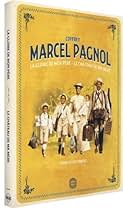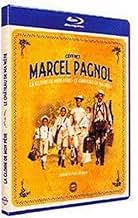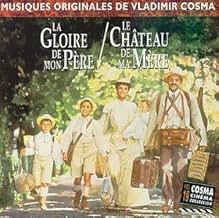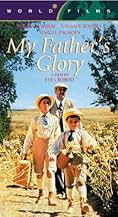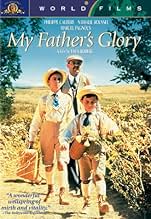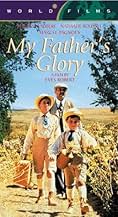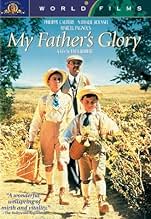ÉVALUATION IMDb
7,6/10
7,2 k
MA NOTE
Évocation de l'enfance heureuse de l'écrivain français Marcel Pagnol, et de ses vacances familiales à la campagne.Évocation de l'enfance heureuse de l'écrivain français Marcel Pagnol, et de ses vacances familiales à la campagne.Évocation de l'enfance heureuse de l'écrivain français Marcel Pagnol, et de ses vacances familiales à la campagne.
- Prix
- 2 victoires et 5 nominations au total
Histoire
Le saviez-vous
- Anecdotes'La Gloire de mon père', published in France in 1957, is the first volume of four autobiographical novels by Marcel Pagnol. The second volume, 'Le château de ma mere', was published in 1958. In the novels, Marcel's meeting Lili takes place in volume two, as does Marcel's decision to stay at Provence as a hermit. The two novels were translated into English and published by Doubleday (in the U.S) as a single book in 1960 under the title 'The Days Were Too Short', This translation was reprinted by North Point Press as a single book titled 'My Father's Glory / and / My Mother's Castle' in 1986.
- GaffesOn the family's holiday, each time that it is raining the sky is bright and without a cloud (except the scene with the storm).
- Citations
Augustine: You need your gun to go shopping?
Joseph Pagnol: You never know.
Commentaire en vedette
This is a very detailed description of the life of a French family. It is a sweet story gently told. It is about growing up, expanding horizons, the influence of friends and family members, enjoying happy times together, and reacting to life's inevitable problems. In this film we recognise moments in our own lives. The film has a universal theme.
In a documentary style the older son Marcel relates how his father Joseph a schoolteacher takes up positions in various parts of France and how before school-going age he sits at the back of the class and quickly learns how to read the text on the blackboard. Family life seems to revolve around teaching and the classroom until Aunt Rose meets Jules on a park seat and eventually marries him. After Jules joins the family circle father learns that there are more things in life than the educational system.
When the family rents a villa in a wild part of Provence, Jules instructs father on the use of the gun and they go on hunting sprees together. On one of these expeditions the son gets lost and meets up with a local boy about his own age. From him he learns about local birds, the eagles, the owls and scary stories about how these wild birds go for the eyes of their prey. This escape into the wild is a charming part of the family's life story and the final parting between the two boys when the family finally leaves is indeed moving.
The story is sprinkled with amusing incidents. For most boys the birth of a child is nothing short of a miracle. They conjecture that the navel is a kind of button which can be unbuttoned to let the baby out. And when father learns to shoot, Jules attaches a target to the outside toilet door. Father is delighted when he gets a bull's eye and Jules does well too. Not so the maid who happens to be inside the toilet at the time. Fortunately she emerges shaken but unharmed.
The film covers so much of French life. It is amazing how much is packed in. The story unfolds at an easy pace with beautiful music that never intrudes and scenery that astounds. I can recommend this little masterpiece about how wonderful family life can be.
In a documentary style the older son Marcel relates how his father Joseph a schoolteacher takes up positions in various parts of France and how before school-going age he sits at the back of the class and quickly learns how to read the text on the blackboard. Family life seems to revolve around teaching and the classroom until Aunt Rose meets Jules on a park seat and eventually marries him. After Jules joins the family circle father learns that there are more things in life than the educational system.
When the family rents a villa in a wild part of Provence, Jules instructs father on the use of the gun and they go on hunting sprees together. On one of these expeditions the son gets lost and meets up with a local boy about his own age. From him he learns about local birds, the eagles, the owls and scary stories about how these wild birds go for the eyes of their prey. This escape into the wild is a charming part of the family's life story and the final parting between the two boys when the family finally leaves is indeed moving.
The story is sprinkled with amusing incidents. For most boys the birth of a child is nothing short of a miracle. They conjecture that the navel is a kind of button which can be unbuttoned to let the baby out. And when father learns to shoot, Jules attaches a target to the outside toilet door. Father is delighted when he gets a bull's eye and Jules does well too. Not so the maid who happens to be inside the toilet at the time. Fortunately she emerges shaken but unharmed.
The film covers so much of French life. It is amazing how much is packed in. The story unfolds at an easy pace with beautiful music that never intrudes and scenery that astounds. I can recommend this little masterpiece about how wonderful family life can be.
- raymond-15
- 26 août 2003
- Lien permanent
Meilleurs choix
Connectez-vous pour évaluer et surveiller les recommandations personnalisées
- How long is My Father's Glory?Propulsé par Alexa
Détails
- Date de sortie
- Pays d’origine
- Langues
- Aussi connu sous le nom de
- My Father's Glory
- Lieux de tournage
- Signes, Var, France(bird hunting party)
- sociétés de production
- Consultez plus de crédits d'entreprise sur IMDbPro
Box-office
- Brut – États-Unis et Canada
- 1 730 856 $ US
- Brut – à l'échelle mondiale
- 1 730 856 $ US
- Durée1 heure 45 minutes
- Couleur
- Rapport de forme
- 1.85 : 1
Contribuer à cette page
Suggérer une modification ou ajouter du contenu manquant

Lacune principale
By what name was La gloire de mon père (1990) officially released in India in English?
Répondre
![Regarder Bande-annonce [OV]](https://m.media-amazon.com/images/M/MV5BNjNlYzQ0NGQtODdlNS00YzRmLTlhYzQtZDdiOTNiZDZlYWYzXkEyXkFqcGdeQXRyYW5zY29kZS13b3JrZmxvdw@@._V1_QL75_UX500_CR0)

